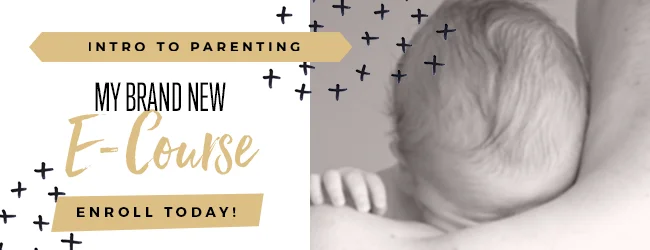The Most Common Mistakes Parents Make When Disciplining Their Child
It can be hard to know the best way to discipline your child in any given moment. The right choice depends on the situation, your child, and the target behavior.
Even if you have studied and memorized The Best Practices of Effective Discipline, getting it right all of the time is impossible. As long as you’re a parent, you’re going to screw up and get it wrong; that’s real life. But you’re also never going to quit trying to be your best, connect to your children, and love well.
Good parenting isn’t perfection, it’s persistence.
In my experience, it helps to know the common pitfalls we all face so that I can examine my own parenting practices and set good intentions! All it takes is a little resilience and courage.
The only reason we ever look at our failures is so that we can grow. So get your “brave” on and let’s all sigh a collective, “oops.” I am right there with you. I just as easily could have titled this post, My 10 Most Favorite Ways to Accidentally Be a Jerk to My Kids.
10 Biggest Discipline Mistakes that Parents Make
>> Not Taking the Time to Connect First
This first mistake isn’t revolutionary, but it’s often easier said than done. I think that most of us know that we need to connect to our kids before we can be effective, but it is really hard to practice. Connection is the first step in all effective discipline. The choices you make during moments of reprimand or redirection will be different for every situation and child, but the constant should always be a clear communication of the connection between you and your child.
If this is the first you’re hearing about “connecting before redirecting,” no problem! I talk more about it here.
>> Being Disrespectful and Not Practicing What They Preach
We need to respect our children and show them the values we want them to manifest. Can we take a hard look at ourselves? At our relationships? How do you treat your child? Your partner/spouse?
When I notice a disturbing behavior in my child, especially if it’s consistent + repetitive, I always make a point to determine if the problem somehow reflects my own attitude and behavior. I make the effort to change myself first. If I am the problem, change usually happens naturally in my kiddo.
Bonus tip: The best thing you can do for your child’s character and behavior is love their other parent well, even if you’re divorced. 7 times out of 10, if a family comes in with a disturbing pattern of disrespect from a child, I notice the same or similar pattern in the parent dyad.
Let me say that another way: Mamas, your child will treat you the way they see their father treating you. Siblings will eventually handle conflict the way that you handle conflict with your partner.
>> Not Adjusting Your Techniques to Fit Your Child
Parenting is uniquely exhausting. I understand. The last thing that you want me to tell you is that you need to taking time to consider everything you know about your child when you are determining the best course of action. That’s hard work.
I don’t expect you to meditate before you tell your kid to stop playing in traffic. But at the end of the day today, you might need to take a few moments to think about your child’s unique temperament, needs, and preferences. What tones and approaches might be best for them in particular. Are there techniques that you are using universally for all your children? Is it working for everyone? If not, take the time to reflect and adjust as needed. Remember, it’s all part of the process!
>> Assuming Children are Little Adults
It’s all good and right to have high expectations for our children. However, their brains are developing and thus they react and think differently. Their brains dysregulated easily and their behavior easily becomes disorganized. A lot of important stuff is going on in that noggin’ and they need your support. Be slow to make attributions about your kids behavior, especially if those assumptions are based on what you expect from or have experienced with other adults.
>> Preaching and Over Explaining
Your messages need to be short and direct. You can have longer conversations later, when your child is receptive, asking questions, etc. The chances of that happening at the time of the conflict is very low. In the moment, try describing what you are seeing rather than barking an order, i.e. “I notice that you’re still playing with your legos after I told you to put them away.” Give your child a chance to think, notice their behavior, and self correct. If there isn’t time for that or it isn’t appropriate, simply be very direct about what you would like them to stop doing and do instead.
Even saying your experience of the child, “What you’re doing right now really bothers me,” is better (plus it models really excellent conflict management skills) than just shouting, “STOP IT AND GET YOUR FEET OFF OF MY FACE; I WANT A GLASS OF WINE AND A LONG COMA.” But who has ever yelled that into the sky? Not me….
>> Not Disciplining
If you are struggling with this one and still haven’t taken my Fundamental Needs of Children course, this is the perfect place to start. You’ll love it and you’ll learn all about the necessity of clear limits and consistent boundaries. Kids who are given rules and expectations are happier, healthier, and more pleasant. They are also more self controlled and the parent’s report better moods.
Prioritizing connection does NOT mean that you shouldn’t be doling out consequences. Real life has consequences (or at least it should) and anything less is a product of entitlement, privilege, or some kind of luck. Either way, you never, ever, want your kid to expect that they can live a reckless life (physically or relationally) without consequences. That just isn’t real life and will seriously hurt their future.
I know discipline doesn’t feel as good as permission. I know it takes more grit and stamina than you might currently have energy for. But if there is anything I can do to encourage you to go the extra mile in this one area, then I don’t want to miss the chance. Discipline matters.
>> Assuming Boundaries are Punitive
This one kills me and seems to be the tertiary caregiver’s favorite pitfall (I am looking at you, grandparents). Boundaries, routines, schedules, and rules keep our kids from being punished and having big, frequent moments of sadness. No boundaries, or allowing your care to be inconsistent is more punitive and more uncaring than the structure the parents/primary caregiver has established because it confuses the child, contributes to insecurity, and extends the length of time it takes to learn a behavior. Extending that learning period can be very painful. I have seen behaviors that should have been eliminated within 2-3 weeks of their first presentation go on for months and even years because the child was regularly encountering a grandparent that was worried their boundaries would feel punitive.
When kids know what is expected of them, they can learn to regulate themselves more easily. Plus, when our kids understand our expectations, they get to experience the joy of knowing they have met them, which is a serious dose of love to their self esteem.
>> Being Inconsistent
Folks like to think they are consistent, but have you considered if your expectations and limits are being kept across all caregivers? A lot of parents are surprised to discover that their children’s caregivers handle discipline very differently. If you have a certain problem behavior or expectation that you are working intentionally on, then make sure that you get on the same page with your child’s babysitters, grandparents, daycare, etc.
Be clear, be realistic, and be consistent. It isn’t always easy (sometimes we are tired or indifferent), but when a child doesn’t intuitively understand a rule, inconsistency is confusing and create painful friction.
>> Distracted Discipline
If you have taken my #lookupchallenge, you know that I take distracted parenting really seriously. In that seven day sprint to more connected, fulfilling interactions with your kids, I work hard to give you the habits you need to be less distracted. I find that this little change by itself, without much else, can significantly decrease behavior problems (and the need for discipline). Few things are more heartbreaking than when an incredibly frustrated family comes in to my office complaining of terrible acting out between their children, only to discover that the kids are feeling somewhat neglected.
It is possible for you to be present physically and not emotionally. Children need to be seen. They also need to “feel felt” as Daniel Siegel says (No-Drama Discipline). It is very normal for a child to act-out in order to get a much-needed interaction with a parent. So before you get aggravated with your kid for doing something that they are basically hired-wired to do, make sure that you have spoken to them, been curious about their experience, and given them a loving, visual witness. Their fundamental needs matter and require a measure of undivided attention. If those haven’t been met, then you can bank on bad behavior.
>> Assuming that nurturing interaction during a meltdown is inherently rewarding and thus, should be avoided
When your child gets activated, you want to get them out of a reactive state and into a receptive state (or at least you want to try). The reactive state is a very instinctual, chemical experience (think “fight or flight”). Children in the reactive state have very little control. Getting them out of that state isn’t rewarding, it’s kind. So go for it. When you lay down the smack and they melt into a frying pan of , “whyyyyyyyyyy,” wrap your arms around them, be warm, and tell them that you aren’t changing your mind, but you’ll be right here until they calm down.
Disciplining is a tough job, and I can talk until I am blue in the face about tips for doing it well and pitfalls to avoid. But the best steps you can take are to simply keep growing and learning, pay attention to your family, connect with your kids, and start being consistent. Don’t hang out in a discouraged place, just make the next step - do the next right thing. That’s it!
While I was pregnant, my husband and I were discussing values and behaviors we cherished, the kind of children we hoped to raise, and what reasonable expectations might look like for our family. If you’re already knee deep in the teen years, it’s okay - just get started. But if you’re early in the process - maybe even pregnant - I have a course that deep dives into parental expectations and helps you get a head start, which really is the best start. Few parenting classes do the hard work to teach you how to connect, be nurturing, and also develop valued routines - from the very beginning.

